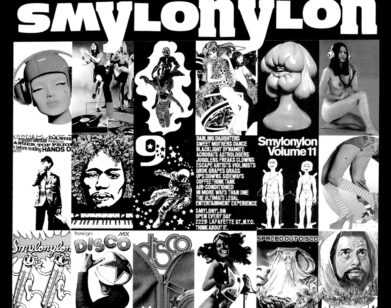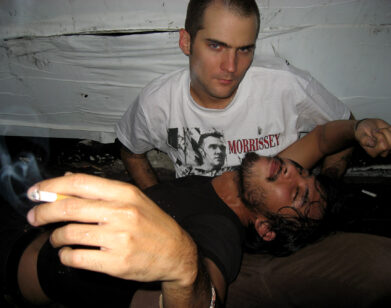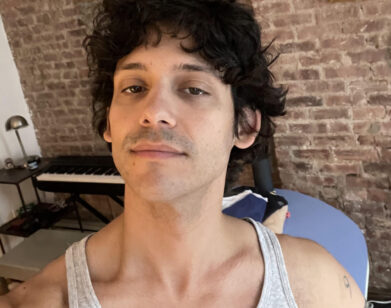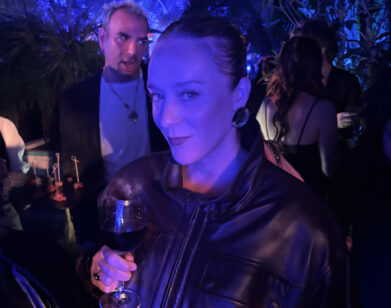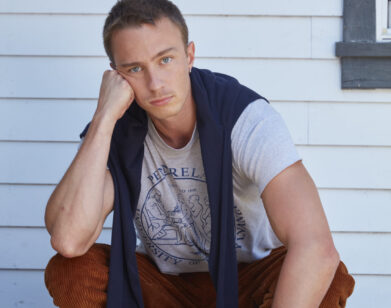we are who we are
Luca Guadagnino and Dev Hynes Discuss Opera, Heartbreak, and the Sexiness of Seth Rogen
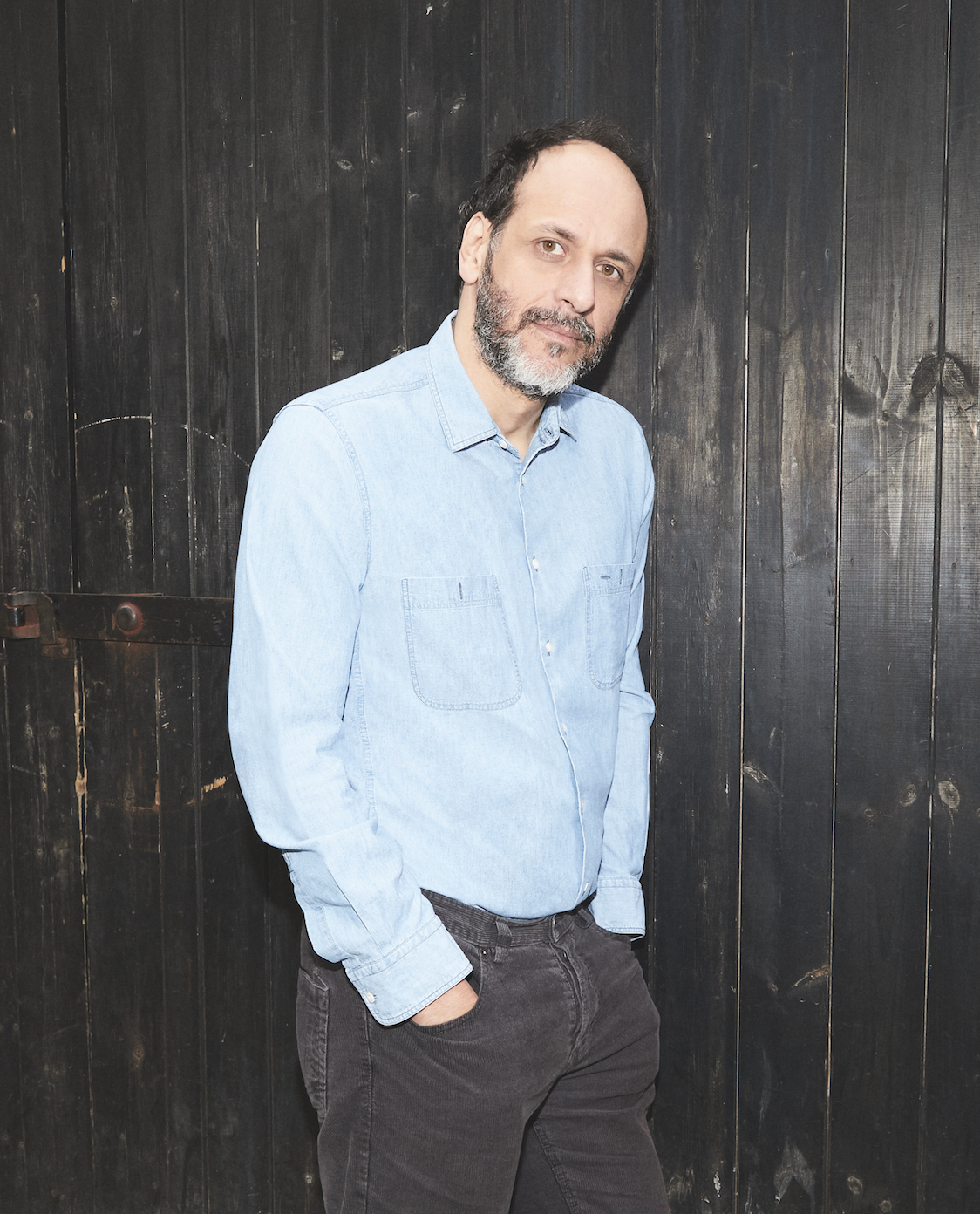
Photo by Alessio Bolzoni.
Anyone who watched Timothée Chalamet finger a blonde-haired peach, bathed in Italian light as its juices squeezed and spilled onto his chest in Luca Guadagnino’s Call Me By Your Name, knows instinctively that the director is a sensualist. Throughout the film, eggs ooze, gazes linger, and tensions bubble against the backdrop of Crema’s twisting alleys and towering duomos. It’s this mark—of sex via symbolism, of the sheer eroticism of daily life—that has made Guadagnino the go-to filmmaker for quiet tales of self-discovery. With We Are Who We Are, his new series for HBO, we find the director back in his native Italy, this time at a U.S. military base. But in typical Guadagnino fashion, the drama is driven more by emotional warfare than the literal kind; through the eyes of Fraser and Caitlin (played by Jack Dylan Grazer and Jordan Kristine Seamón), a pair of curious American teens, we watch the tangled knot of adolescence unfold in real time, the growing pains at once devastating and intoxicating.
With a well-rounded cast that includes Chloë Sevigny, Kid Cudi, and a whole bunch of newcomers, as well as a score by Dev Hynes (the “R&B miracle worker” known as Blood Orange), the series is one of several buzzy projects up Guadagnino’s sleeve. Earlier this month, he released Salvatore: Shoemaker of Dreams, a documentary about the fashion designer Salvatore Ferragamo, and this summer, he announced that he will team up with Seth Rogen and Evan Goldberg for a film based on the life of Scotty Bowers, the notorious Old Hollywood pimp. Joining forces with the Sausage Party duo may seem an unlikely choice, but for Guadagnino, the self-described “voyeur,” it was a no-brainer: “I’m glad to say that both Seth and Evan are very sexy, so I cannot wait to work with them,” he tells Hynes over a long-winded Zoom call from his mother’s Milan apartment, adding that the film will be lead by the “principle of pleasure”—”which is always a good thing to do.” —SARAH NECHAMKIN
———
LUCA GUADAGNINO: Where are you now?
DEV HYNES: I’m in L.A. I’ve been here since the beginning of March now.
GUADAGNINO: And are you lock-downing yourself?
HYNES: I am. [Laughs] There’s not really anything to do, so I haven’t really done anything. Are you in Milan?
GUADAGNINO: I’m in Milan.
HYNES: Things are good there, right?
GUADAGNINO: Well, I don’t know if good is the right word, given that you see that the engine of society is very slowly starting to move back, which means there is a sense of economical and moral depression happening right now. Because I’m an entertainer and I work in entertainment, I can’t not acknowledge and be very worried about how this pandemic is severely hitting the entertainment industry. Despite the power and the capacity of penetration of the markets of the streamers, what about live shows? What about live performances? What about the beautiful collective experience of sitting one beside the other watching a movie? That is a very big worry. At the same time, I see people behaving in the streets almost as if nothing ever happened, which is quite stressful.
I’m very proud of how your presence in the show is so organic. The show has a musical approach that goes mostly through the experience of great classical composers of the 20th century, and you add your voice to their voice as composer in a beautiful thread that is sewed all together from Paul Bowles through John Adams and Julius Eastman. We wish you were the protagonist, because the emotional drive of the two leads, Fraser and Caitlin, is to get to see you perform. I think it’s fantastic that you could be playing both roles, and you could be organically kneading yourself into the flesh and the dough of the show so pervasively.
HYNES: Thank you for threading me in. I saw that you have a documentary on Ferragamo. I want to know more about that.
GUADAGNINO: I’m like a fisherman. I like to flesh out the nets in the water and then get the fishes into the net. Fishes being the creative process that makes and produces stuff. I always constantly try to make sure that I and the people I work with, including you in this case, we churn ideas, and we make things out of our capacity of doing things. A few years ago, I was thinking about craftsmanship, and I came back in my mind to this book that the late Salvatore Ferragamo himself wrote. It was his autobiography, which he worked on with ghostwriters who were two screenwriters of Alfred Hitchcock. Salvatore Ferragamo is an originator of things. He left Italy when he was a kid and went to America, and he participated in the birth and the building of modern Hollywood. I spent three years interviewing people from every corner of the fields that Salvatore tackled to understand the world and the times and the places where Salvatore operated. That’s how I ended up having this movie ready, coincidentally, at the same time as We Are Who We Are.
HYNES: That’s one of the things I like about you. I always think personally that the best creative people are just consistently studying. It never stops. You’re working to understand something, so there is going to be infinite legs happening of things that you’re building and building and building on. And yeah, sometimes the things are going to hit the world at the same time.
GUADAGNINO: The possibility to learn is always wonderful. It’s quite interesting to jump from place to place. In We Are Who We Are, there is a moment in which one character says to Fraser, “So, do you want to become a fashion designer?” That’s a link. But Fraser doesn’t want to become a fashion designer. People think he wants to become a fashion designer, because he has a great sense of style, like you do.
HYNES: Oh, I appreciate that. Likewise. I love that character. I don’t think I’ve ever seen a character like that.
GUADAGNINO: I think Fraser has something that is very now, which is he’s non-judgmental. He has the capacity of welcoming any identity. But at the same time, he is rabid and really hungry for knowledge. He wants to know more and more. He loves the capacity of prophesying the future, but at the same time, the beauty of the past. What I like about him is that he’s someone who can confront himself with legacies and learn from them and then dream big from them and make some more new scenarios out of his experience of life. I hope that this rings with the people of his age, because Jack is 16, and Fraser is 15 in the show, and I think these people are the great answer to the question of whether we could really hope for a generation that will be able to deflect in the future without the need of destroying the past.
HYNES: You can really feel that. He really became that character.
GUADAGNINO: He’s a catalyst. He changes people. Were you like him when you were 16?
HYNES: I was, but I think I was more introverted. I had a similar inner-energy. But the way he talks to his mother, I never dared speak to my mother like that. But that creative restlessness, I definitely relate to.
GUADAGNINO: Do you feel restless now?
HYNES: I do. I knew before this that I worked a lot, but I didn’t realize that in my life in New York, I ran around a lot. I leave the house. I drink coffee. I read in the park. I go to my studio. I do these things all day. I think in my mind that would sometimes feel like I wasn’t doing anything, but now I see that I was doing a lot in those periods. I know you’ve directed opera before, with “Falstaff.” Have you thought about doing that again? What was the thought process that led to that?
GUADAGNINO: I always dream of doing another opera. I know what I did wrong in that one, so I know how not to do it again. I once proposed to make Macbeth, except in Bashar and Asma al-Assad’s palace in Syria, which was interesting. I’d also like to make a John Adams opera. I’d like to make The Death of Klinghoffer. That would be wonderful, because I am half-Arab. I know this is a very controversial opera, and I’d like to do it because I remember very well the Achille Lauro hijacking and the Klinghoffer manslaughter. I was probably 13. It’s something that I’m very interested in.
HYNES: I couldn’t remember if I told you, but I was at the Met’s Klinghoffer production when there was a protest outside.
GUADAGNINO: Rudy Giuliani was there?
HYNES: Yeah.
GUADAGNINO: He likes the idea of creating mayhem in front of a cultural institution where there is a great, important piece of music and opera that is posing questions, and he doesn’t ask himself the questions when he’s defending Mr. Trump.
HYNES: Exactly. He’s quick to ask them of other people. I would love to see more opera from you. I saw I Am Love twice in the cinema, and I remember feeling like I’d watched an opera. Even A Bigger Splash feels like that to me. What was the genesis of We Are Who We Are?
GUADAGNINO: I would say the need of friendship and making peace with one another, because I had worked briefly with the producer Lorenzo Mieli. Because both Lorenzo and I are big personalities, we clashed in that first experience in which we both were producers. We parted ways really abruptly and not nicely. A few years later, Lorenzo sent an olive branch to me saying, “I want to talk to you.” And I said, “Okay. Even if I promised myself never to talk to you again, I will.” And we sat, and immediately I realized how much I liked Lorenzo, and he said, “What do you think about making a show for TV, in which we explore the, let’s say, fluidity of gender within the boundaries of American suburbia?” I don’t like topic movies, but I was sparkled with the idea of the possibility to watch people behaving on screen for the runtime of a show, which is long. I counter-proposed: “Why don’t we talk about the behavior of people within the boundaries of an American military base in Italy?” And maybe in the future we can have another military base, maybe in Japan, maybe in Africa? Wait a second, Dev.
HYNES: A long running time is good because you get a chance to get so much deeper in with everyone. The moments feel earned. Have you been watching films?
GUADAGNINO: I saw a few films. Recently, I watched this great Italian movie from the ’60s called Adua e Le Compagne by Antonio Pietrangeli. Adua and Her Friends in English. Another was a movie from a great Ethiopian director, Haile Gerima, called Harvest: 3,000 Years. I grew up in Ethiopia, so I’m very into going back to what has been my experience there, even if I can get glimpses of it through the work of other filmmakers. It’s from 1976, which is the year I left Ethiopia, because of the civil war. We were foreigners, and we were not welcome by the new regime that squashed the great movement of reform that came from the students who wanted to have better lives and social conditions.
HYNES: Have you been back to Ethiopia since?
GUADAGNINO: No, but I promised myself to do so every now and then. My father passed away in mid-May at the age of 88. And, of course, Ethiopia, for me, happened because of his restlessness as a young man. He brought us there. I was born in August in Sicily, and we moved when I was one-month old, so my childhood is there. I feel like now that my dad is not with me anymore, it’s the time which I need to do it instead of chickening out, as I did in the past. I think it’s going to be tough because it’s the experience of the place as it is now and the DNA of the memories. I think of Ethiopia all the time. It’s with me all the time.
HYNES: How old were you when you left?
GUADAGNINO: Five-and-a-half. I would say my sense of space and light and my sense of self, in a way, have been forged by that experience. Also, I am the third child of three. So usually, the last one is the one left alone, and I was more free to browse the world. I had my secret adventures in that world, even if it was the garden. One day, I must do a movie about that. One of the greatest things for a filmmaker is to do an autobiographical movie. I think I should try to tackle it.
HYNES: Where is your mother?
GUADAGNINO: My mother is here. Now that she’s a widower, she left the house where she spent the last four years with my dad, in Crema where I shot Call Me By Your Name, and she’s moving to Milan. Finally, the house that she’s moving into is ready, and she has three days where they have to bring all the furniture. I’m having her in my place, which is nice and delightful and painful at the same time. I think my mom thinks that I am the second husband. I’m trying with delicacy and tactfulness to let her understand that I’m not. My mom is Algerian. You know when they say Italian moms are really intensely close to their children? You have to imagine an Algerian mom being 10 times that. I think she mistakes me not having a wife—because I may have a husband but not a wife—with her being my wife. It’s tough, but she’s adorable.
SARAH NECHAMKIN: I saw that you have a movie with Seth Rogen and Evan Goldberg coming out. Is there anything else you can say about that?
GUADAGNINO: I can say a couple of things. Somebody sent me some tweets in which they claimed that it’s impossible that straight lads are going to write a movie about a bisexual pimp. Somebody even claimed that I’m straight. Number one, it’s very exotic that there’s a police of identity that decides who can do what based on the assumption of their inclination in the bed. Number two, some of the most exciting and titillating and unabashedly honest, emotional bromances that, of course, include a beautiful undercurrent of homosexuality, come from Seth and Evan. I’m thinking of the great Superbad and its beautiful finale. When we talked about adapting the life of Scotty Bowers, the first people we thought of were Seth and Evan. And by the way, because I’m a voyeur and a sensualist, I’m glad to say that both Seth and Evan are very sexy, so I cannot wait to work with them. I have to find a way to come to America to be close to them instead of working by Zoom or Skype so that I can be close to their sexiness. The movie is going to be outrageous, and it’s going to be savvy like Scotty Bowers was, and it’s going to be led by the principle of pleasure, which is always a good thing to do. Because pleasure and joy are more interesting than the imposition of enjoyment through a lens that is suffocating.
HYNES: When will you be done with Born to Be Murdered?
GUADAGNINO: Born to Be Murdered, for which you made a great song that opens the movie, is almost finished. We are right now in the process of finding a distributor. I’m very proud of the movie. It’s such a timely movie without wanting to be timely—the feeling of restlessness and the moral need of action from someone that is not seen and finally wants to be so. John David Washington plays the lead, and is sublime in it. It’s a complicated endeavor for me right now, because my partner of 11 years, Ferdinando Cito [Filomarino], who directed the movie beautifully, left me this month, so I’m tortured, because of course I love him and at the same time the movie’s great, but we’re not together. That’s the bill you get when you live a life where life and cinema and everything is intertwined. It’s difficult, because the movie’s great and Ferdi’s great and John David is amazing, but we’re not anymore. We’ll see.
HYNES: Sorry to hear.
GUADAGNINO: It’s an intense time. With We Are Who We Are, we wanted to make something about here and now, and I believe that the here and now is around us. To think that our lives are not impacted by what is happening in society is crazy. We need to acknowledge it. I believe that the Trump election was a blaster. It was something that was a ghost that people feared, and they didn’t want to believe it. I actually won two bets in May [of 2016], because I said he’s going to win, and people said they didn’t believe me. I won two Hermès bags that I claimed.
NECHAMKIN: Really?
GUADAGNINO: Yeah. I knew he was winning for one reason. I was in Italy in 1994 when Berlusconi won. The worst crotchy feelings, the things that come from the bottom of your body, are always there in every one of us. If we do not understand that Trump is a sort of autobiography of America, that Trump is not an alien landing in America, but is within America, within the fiber of American imagery and the fiber of American morality—if we do not understand that as much as I tried to understand that Berlusconi was an autobiography of Italy, it’s going to be polarized all the time. It’s going to be missing the point, and people like Trump will be unleashed. Both Trump and Berlusconi participated actively in the building of pervasive imagery. Like going to therapy with a great psychoanalyst, we should think about it and process why we have a Trump within in order to move on and, like in the great movie Doctor Sleep, lock the Trump in us in a box with a very thick lock. Anyways, the kids in We Are Who We Are, they don’t give a shit about Trump, because they’re beyond him. And they’re fantastic.
I feel like Richard, the character played by the wonderful Kid Cudi, being a Trumpian is absolutely organic to the show, but also it is organic to what reality carries with it. I think that who voted for Trump comes from every angle of American society, and to not acknowledge that is in the best way a consolation and in the worst way a manipulation. We don’t need consolation, we need critique. We need to be open to the otherness of others, even if that bothers us. 2020 has been, in every possible way, a very tense year for all the world, and for me. But at the same time, friendships, they’re coming to life, and we made this show that we’re all proud of, which is great.
I even went to Sicily in May before my dad passed, and I shot a tiny film called Flowers, Flowers, Flowers, in which I go with my iPhone—I don’t have an iPhone, but I used my friend Alessio’s iPhone. I went to visit some friends that I grew up with when I was a teenager in Sicily, asking them how they were living their lockdown in Sicily. And then I went to my father’s village, Canicattì, to visit the house where he grew up and where I went as a child to spend some holidays. Difficult times, and yet life goes on and the process of trying to find things and being open is still there.
HYNES: Do you think that would be a film you would share with the public?
GUADAGNINO: It’s a gift I give. If someone wants it, I show it.
HYNES: That’s so beautiful.
GUADAGNINO: Let’s try to make Interview readers weep.
HYNES: Oh, I think everyone’s on the edge of tears anyway nowadays.
GUADAGNINO: We end in tears. And the tears are not salty—they’re sweet, but they’re tears.

